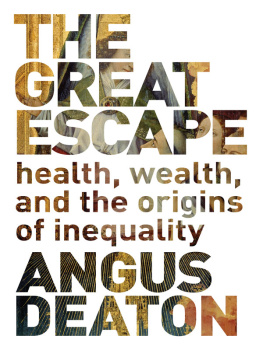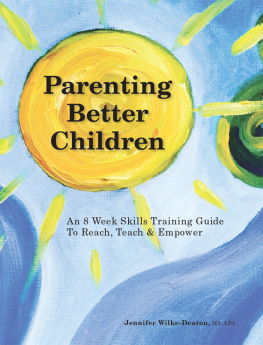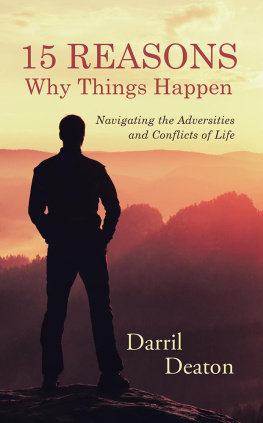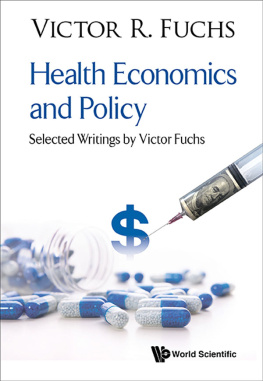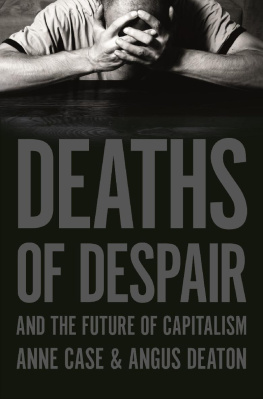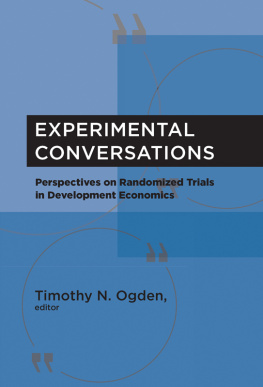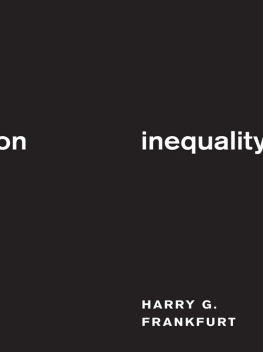
THE GREAT ESCAPE
THE GREAT ESCAPE
Health, Wealth, and the Origins of Inequality
ANGUS DEATON
Princeton University Press
Princeton and Oxford
Copyright 2013 by Princeton University Press
Published by Princeton University Press,
41 William Street, Princeton, New Jersey 08540
In the United Kingdom: Princeton University Press, 6
Oxford Street, Woodstock, Oxfordshire OX20 1TW
press.princeton.edu
Jacket and endpaper art: Detail of The Last Judgement,
c. 1451 (oil on panel), Rogier van der Weyden
(13991464) / Muse de lHtel-Dieu, Beaune, France.
Paul Maeyaert / The Bridgeman Art Library.
All Rights Reserved
ISBN 978-0-691-15354-4
Library of Congress Control Number: 2013941754
British Library Cataloging-in-Publication Data
is available
This book has been composed in Hoefler Text
with Ultramagnetic display by Princeton Editorial
Associates Inc., Scottsdale, Arizona.
Printed on acid-free paper.
Printed in the United States of America
10 9 8 7 6 5 4 3 2 1
In memory of Leslie Harold Deaton
Preface
THE GREAT ESCAPE is a movie about men escaping from a prisoner-of-war camp in World War II. The Great Escape of this book is the story of mankinds escaping from deprivation and early death, of how people have managed to make their lives better, and led the way for others to follow.
One of those lives was my fathers. Leslie Harold Deaton was born in 1918 in a tough coal-mining village called Thurcroft in the South Yorkshire coalfield. His grandparents Alice and Thomas had given up agricultural labor in the hope of doing better in the new mine. Their eldest son, my grandfather Harold, fought in World War I, returned to the pit, and eventually became a supervisor. For my father, it was difficult to become educated in Thurcroft between the wars because only a few children were allowed to go to high school. Leslie took odd jobs at the pit; like the other boys, his ambition was that, one day, he would get the chance to work at the face. He never made it; he was drafted into the army in 1939 and sent to France as part of the ill-fated British Expeditionary Force. After that debacle, he was sent to Scotland to be trained to be a commando; there he met my mother and was fortunate enough to be invalided out of the army with tuberculosis and sent to a sanitarium. Fortunate because the commando raid on Norway was a failure, and he would almost certainly have died. He was demobilized in 1942 and married my mother, Lily Wood, the daughter of a carpenter in the town of Galashiels in the south of Scotland.
Although deprived of a high school education in Yorkshire, Leslie had gone to night school to learn surveying skills that were useful in mining, and in 1942, with labor in short supply, those skills made him an attractive hire as an office boy in a firm of civil engineers in Edinburgh. He determined to become a civil engineer himself, and, starting from a base of almost nothing, he put in a decade of hard work and finally qualified. The courses were a great struggle, especially mathematics and physics; the night school he attended, now the Heriot-Watt University in Edinburgh, recently sent me his examination results, and struggle he certainly did. He took a job as a water supply engineer in the Borders of Scotland and bought the cottage where my mothers grandmother had lived, and where in earlier days Sir Walter Scott was said to have been an occasional visitor. For me, moving from Edinburghwith its grime, soot, and miserable weatherto a country villagewith its woods, hills, and trout streams and, in the summer of 1955, endless sunshinewas a great escape of its own.
In classic manner, my father then set about making sure that I could do better than he had done. Somehow, he managed to persuade my local schoolteachers to coach me outside class for the scholarship examination at a prestigious Edinburgh public (i.e., private) school, where I was one of the two kids in my year that got a free ride; the annual fees were more than my fathers salary. I eventually went to Cambridge as a mathematics student and in time became an economics professor, first in Britain and then at Princeton. My sister went to university in Scotland and became a schoolteacher. Of my dozen cousins, we were the only ones to go to university and, of course, none of the previous generation had the chance to do so. Leslies two grandchildren live in the United States. My daughter is a partner in a successful firm of financial planners in Chicago and my son is a partner in a successful hedge fund in New York. Both received a rich and varied education at Princeton Universityvastly superior in its depth, range of opportunities, and quality of teaching to my own dry and narrow experience as an undergraduate in Cambridge. Both of them have a standard of living beyond anything that Leslie could have imaginedthough he lived long enough to see a good deal of it, and to be pleased by it. His great-grandchildren live in a world of wealth and opportunity that would have been a far-fetched fantasy in the Yorkshire coalfield.
My fathers escape from Thurcroft is an example of what this book is about. He was not born into abject poverty, though it would seem so by todays standards, but he ended his life in comparative affluence. I do not have numbers for the Yorkshire mining villages, but for every thousand children born in England in 1918, more than a hundred did not live to see their fifth birthday, and the risks would likely have been higher in Thurcroft. Today, children in sub-Saharan Africa are more likely to survive to age 5 than were English children born in 1918. Leslie and his parents survived the great influenza pandemic of 191819, though his father died young, killed by a runaway wagon in the pit. My mothers father died young too, from an infection following an appendectomy. Yet Leslie, in spite of his youthful encounter with tuberculosisthe Captain of Deathlived into his 90th year. His great-grandchildren have a good chance of making it to 100.
Living standards are vastly higher today than a century ago, and more people escape death in childhood and live long enough to experience that prosperity. Almost a century after my father was born, only five out of a thousand British children dont make it through the first five years, and even if the figure is a little higher in what is left of the Yorkshire coalfieldthe Thurcroft pit closed in 1991it is only a tiny fraction of what it was in 1918. The chance to be educated, so difficult for my father, is taken for granted. Even in my cohort, fewer than one in ten British kids went to college, while today the majority has some form of tertiary education.
My fathers escape, and the future he built for his children and grandchildren, is not an unusual story. Yet it is far from universal. Very few of Leslies cohort in Thurcroft ever obtained a professional qualification. My mothers sisters did not do so, nor did their spouses. Her brother and his family migrated to Australia in the 1960s when their ability to cobble together a bare living from multiple jobs collapsed with the closure of the railway line through the Scottish Borders. My children are financially successful and secure, but they (and we) are extraordinarily fortunate; the children of many well-educated and financially successful people are struggling to do as well as their parents did. For many of our friends, the future of their children and the education of their grandchildren is a constant source of worry.
This is the other side of the story. Even though my father and his family were living longer and prospering in a population that was living longer and prospering on average, not everyone was as motivated or dedicated as my father, nor was everyone as lucky. No one worked harder than my father, but his luck was important toothe luck not to be among those who died as children, the luck to be rescued from the pit by the war, the luck not to be on the wrong commando raid, the luck not to die from tuberculosis, and the luck to get a job in an easy labor market. Escapes leave people behind, and luck favors some and not others; it makes opportunities, but not everyone is equally equipped or determined to seize them. So the tale of progress is also the tale of inequality. This is especially true today, when the tide of prosperity in the United States is the opposite of equally spread. A few are doing incredibly well. Many are struggling. In the world as a whole, we see the same patterns of progressof escapes for some, and of others left behind in awful poverty, deprivation, sickness, and death.
Next page
